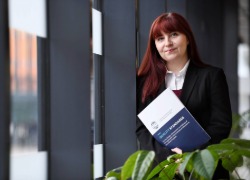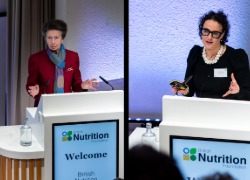Water recycling helping the environment while saving companies money
A Teesside University graduate has been involved with an innovative company, finding ways to reuse and recycle waste water – benefiting the environment and helping businesses save money.
Sam Appleyard, who was awarded a MSc Analytical Chemistry in November, has been applying his specialist knowledge and skills at Redcar-based CatalySystems in a project to develop analytical tools to use in the laboratory alongside the bench-scale reactor units.
The company uses a process called photocatalysis to destroy organic contaminants in waste water streams. It is a polishing process which can treat the water to a stage where it can be recycled and reused, rather than being disposed of. It has recently launched its N1200 series of water treatment systems for industrial applications.
Water recycling has huge environmental benefits in terms of providing an additional source of water, decreasing waste water and reducing and preventing pollution.
Sam, 22, from Coulby Newham, joined CatalySystems in June on a six month Knowledge Exchange Internship (KEI), a business service partly funded by the European Regional Development Fund (ERDF) which is unique to Teesside University.
Teesside University leads the way in delivering flexible knowledge transfer projects, bringing a business together with a graduate and a team of specialist experts who transfer their technical know-how, research and innovation to help achieve key business objectives.
As well as being beneficial for businesses, it provides graduates with a route into employment.
During his time at CatalySystems Sam developed standard methodologies for the analysis of waste streams treated in the company’s bench-scale reactors, gaining vital technical laboratory expertise and project management experience.
A fantastic scheme He said: 'The KEI scheme has been fantastic and really bridges the gap between education and experience. Employers are always looking for people with experience so this has been perfect for me.
'I have been responsible for managing the throughput of waste water samples within the laboratory, looking at ways to analyse certain compounds and the way they are treated.
'It has been a really enjoyable project and the KEI will definitely help me in the job market.'
CatalySystems, founded three years ago, has attracted international interest for its industrial product range.
Neil Foster, Technical Director, said: 'The products we are developing are environmentally friendly, energy efficient and also save companies money in terms of the disposal of water.
'We have only been based here since April and contacted Teesside University to see how we could work together.
'Having Sam on board has been excellent for the company – he’s been extremely enthusiastic and has come up with some innovative ideas and processes. He has also been able to run the laboratory, giving me more time to focus on the design of our products and introduce these to market.
'The KEI scheme has really benefited myself, Sam and the company – I would recommend it and hopefully we can use it again in the future.'
Ideal for businesses Laura Woods, the University's Director of Academic Enterprise, said: 'A KEI is ideal for a company needing expert help with a short-term project, perhaps to introduce new technology or new working practices. As well as a full-time graduate on the staff, the company gets academic support to deliver its improvement programme.'
Shirley O’Hare, Senior Lecturer in Forensic Chemistry at Teesside, acted as the academic support during Sam’s KEI.
Sam added: 'One of the reasons I chose to come to Teesside University was because of its reputation for working with businesses – it was definitely the right decision.'
For more information on Knowledge Exchange Internships, contact Teesside University on 01642 384068, email Business@tees.ac.uk.
Notes This project is part-financed by the European Regional Development Fund (ERDF), managed by the Department for Communities and Local Government, securing £300m investment.
The project will make a major contribution to the ambition of the ERDF Competitive Programme 2007-13 and by increasing the numbers and survival of business start ups in the region and increasing business productivity.


 Teesside academic leads the way in setting professional
...
Teesside academic leads the way in setting professional
... Teesside University leads new research into Roman Empire’s
...
Teesside University leads new research into Roman Empire’s
... Nourishing Tomorrow: my insights from the British Nutrition
...
Nourishing Tomorrow: my insights from the British Nutrition
...